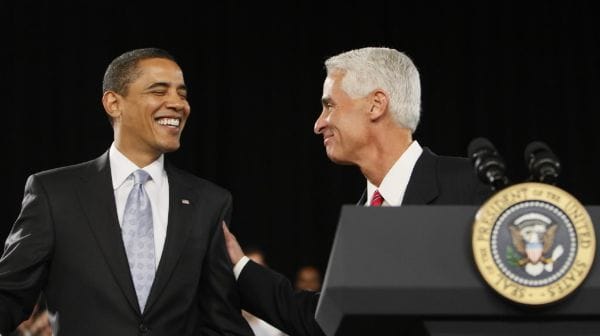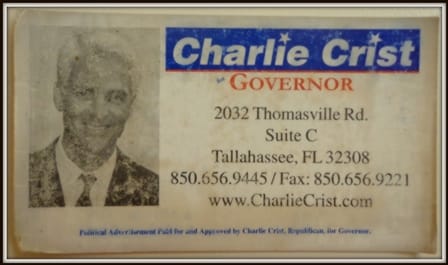Charlie Crist: The Provisional Independent


Two years, seven months, and nine days. That was the tenure of Charlie Crist’s official status as a self-proclaimed independent. On Friday evening, the former Republican Governor of Florida jumped on his Twitter account for the first time since Thanksgiving and declared himself an adoring new member of the Democratic Party:
Proud and honored to join the Democratic Party in the home of President @barackobama! twitter.com/charliecristfl…December 8, 2012
This announcement should not come as a shock among those familiar with his career. For most of his public life, Crist has been socially pliable, often shifting with the winds of political expediency. By no means did he follow in the footsteps of his gubernatorial predecessor, Jeb Bush, whose personality at state events was often seen as firm and decisive. Crist was quite the opposite, exhibiting a personality that was more casual and relaxed. For better or worse, Floridians knew what they were getting with Bush, but they were never quite sure what they were getting with Crist.
In 2006, when he was running for the governor’s office, my wife and I had just moved to South Florida and we were both deeply concerned about the housing boom that made realistic, affordable residences hard to acquire unless you were already in the market or willing to take a risky bet. Eager to hear the prospective governor’s thoughts on the matter, I visited one of his campaign stops in West Palm Beach where he listened, shook my hand, gave me his card, and fittingly said, “I have a plan. Vote for me and I’ll make it easier for you and your wife to buy a home.”

The business card was devoid of slogans and rhetoric. His campaign team had done an excellent job of stripping his image down to the bare essentials: name, picture, address, and phone number. In other words, Charlie Crist was a blank slate. His plans were little more than an ongoing collage of public opinion. The “I have a plan” might have been more appropriately stated, “We’ll work something out.”
Throughout his first couple of years as governor, Crist proved to be less decisive than he was moderate, a trait rarely viewed as successful among leaders in states leaning heavily in one political direction over another. Yet the population of Florida, with its mixed bag of northern and eastern conservatives, I-4 moderates, progressive immigrants, and big city liberals, was, at least temporarily, a good fit for any partisan politician claiming to be all things to all people.
Two years after our initial exchange and just before the bubble burst on Wall Street, Crist and I shook hands again. This time, we were both attending a meeting at the Chamber of Commerce in Palm Beach County. He gave a short speech about the success of our economy and warmed the crowd with his easygoing personality and light hearted humor. But when the bottom fell out from under Florida homeowners a few weeks later and the country elected Barack Obama to the White House, Crist was asked about who he perceived to be the leader of the Republican Party. Bush? McCain? Himself?
“I think… well, there is an actual leader. His name is President Obama. The people elected him and I’m willing to give him a good shot and try to help make this work.”
Crist saw his own words as an attempt at bipartisanship between a Democratic president, a Republican governor, and a state with crippling unemployment. Republicans didn’t see it quite the same way. Crist went on to endorse the controversial stimulus bill, only further enraging the members of his party. Within weeks, he was branded a RINO—Republican In Name Only.
By the time Crist announced his intentions to leave the governorship and run for the United States Senate in 2009, heavy speculation arose that he should no longer call himself a Republican candidate, but rather, he should officially classify himself as an Independent and abandon partisanship altogether. Heeding the advice of friends and colleagues, Crist declared himself an ‘Independent’ on April 29, 2010, but a full departure left him with little support and few endorsements. Instead of a resounding victory, Crist conceded to a Miami-born Republican and rising star named Marco Rubio.
No longer a governor, a prospective senator, or a political candidate, Crist faded from the limelight and drifted into a virtual archive of Florida leaders. That is, until he showed up on stage at the 2012 Democratic National Convention where he opened and closed with these words:
“What an honor to be here with you, to stand with our president, Barack Obama. Half a century ago, Ronald Reagan, the man whose relentless optimism inspired me to enter politics, famously said that he didn't leave the Democratic Party; the party left him. I can certainly relate. I didn't leave the Republican Party; it left me. Then again, as my friend Jeb Bush recently noted, Reagan himself would have been too moderate and too reasonable for today's GOP...”
“...When I look at President Obama, I see a leader with a cool head, a caring heart and an open mind, a president who has demonstrated through his demeanor and through his deeds that he is uniquely qualified to heal our divisions, rebuild our nation and lead us to a brighter future together. That's the leader Florida needs. That's the leader America needs. And that's the reason I'm here tonight, not as a Republican, not as a Democrat, but as an optimistic American who understands that we must come together behind the one man who can lead the way forward in these challenging times: my president, our president, Barack Obama! And if you see the president before I do, give him a hug for Charlie!”
Not as a Republican. Not as a Democrat. Or so he said. In making his plea to independent voters, Crist sounded less like an independent and more like a man in transition. Indeed he was. And with a formal announcement on Friday night, Americans confirmed what they had already suspected: Charlie Crist had only ever been a provisional independent, using the title as a temporary stepping stone between political parties.



